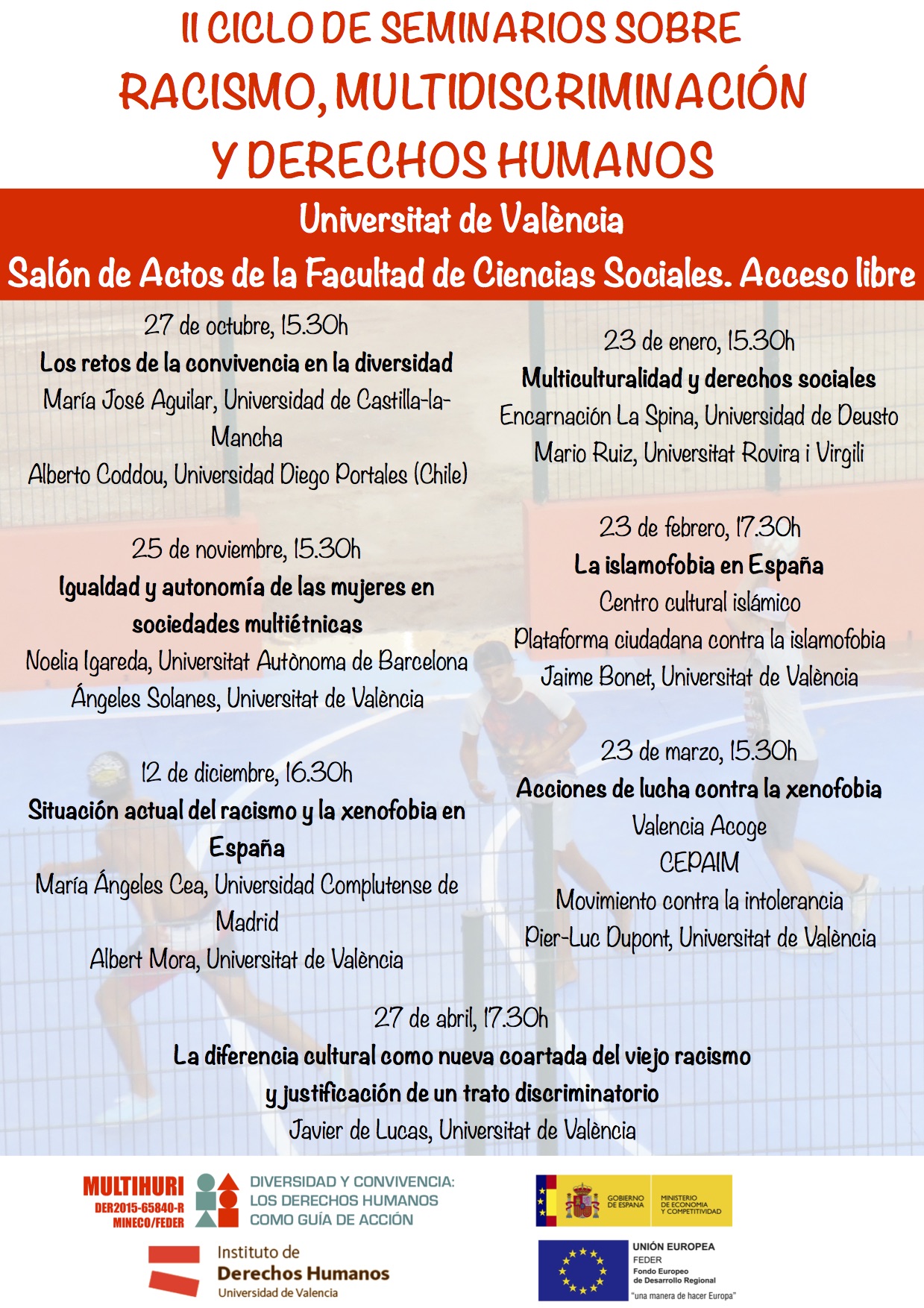Inauguration of the II Seminar series on racism, multi-discrimination and human rights
From the building of walls against potential asylum seekers to the rise of far-right parties, the restriction of foreign nationals' social rights, the imposition of obstacles to naturalisation and the selective prohibition of minority practices, the institutionalisation of racism is undermining the fundamental principles of conviviality in European societies. In keeping with its mission of legal-political evaluation and criticism, the MULTIHURI team will inaugurate on 27 October its II Seminar series on racism, multi-discrimination and human rights, going on until the spring of 2017. Once a month, various academic and civil society experts will meet at Valencia University's Faculty of Social Sciences to identify the challenges surrounding racist discriminations and propound ways of tackling them effectively and fairly. All sessions will be open to the public and leave time for a debate among all those attending.
In the opening seminar, María José Aguilar Idáñez, professor of Social work and social services at University of Castilla-la-Mancha, will address immigration and cultural diversity as structural phenomena calling for responses based on the principles of effective integration, participation and intercultural conviviality. This implies the substitution of traditional sectoral policies, which arise as a response to emergency situations, by comprehensive strategies. The first part of the intervention will offer critical reflections on the dominant models of diversity management in order to explore ways of building democratic societies based on the rule of law and on the inclusion of all their members (not only those who were born in a specific place or continent). Professor Aguilar will outline a critical-transformative approach to interculturalism that is not limited to the recognition of differences and the promotion of positive interactions among persons or groups with diverging cultural affiliations, but emphasises the fight against social, economic and political inequalities, as well as against ethnic, racial and cultural discriminations. The second part will examine one of the main current challenges for conviviality: indifference and the construction of moral boundaries as an instrument of the politics of death. The denial of the rights of people seeking refuge constitutes a moral paradox in societies that proclaim universal values. This moral paradox will be explained through the thesis that indifference, understood as the erasure of the other's humanity, and the justification of violence toward displaced people calling for assistance reflect the existence of moral boundaries that exclude those human beings from our moral space. Moral boundaries are a fundamental mechanism of the politics of death, because they legitimate institutional practices and political decisions that, while not killing directly, are premised on a freedom to let people die. The construction of such moral boundaries is the keystone of the system of racist domination that we must dismantle. The presentation will conclude with some strategies of resistance against these paradoxes and challenges.
In the second part of the seminar, Alberto Coddou McManus, professor of Constitutional law and researcher at Diego Portales University's Human Rights Centre, will analyse anti-discrimination law from the perspective of Nancy Fraser's critical theory of social justice. In particular, he will sustain that the debate around the harm caused by discrimination and the reasons for regulating it through law does not adequately account for the promises of anti-discrimination law. To achieve this, we must resort to a pluralist anti-discrimination theory that allows us to locate this area of the law in a perspective of social emancipation. In this way, anti-discrimination law can be characterised as an instrument that combats the lack of recognition, while being "interlocked" with two other spheres of justice: the economy and politics. This approach allows us to understand its strenghts and weaknesses, what it can and cannot promise, what it can and cannot achieve in contemporary societies.
To read the chapter on which professor Coddou's intervention will be based, click here.
For all the details on this seminar and subsequent ones, please see the poster below.



















